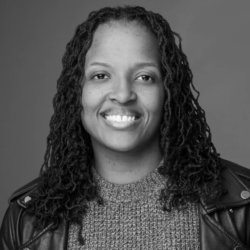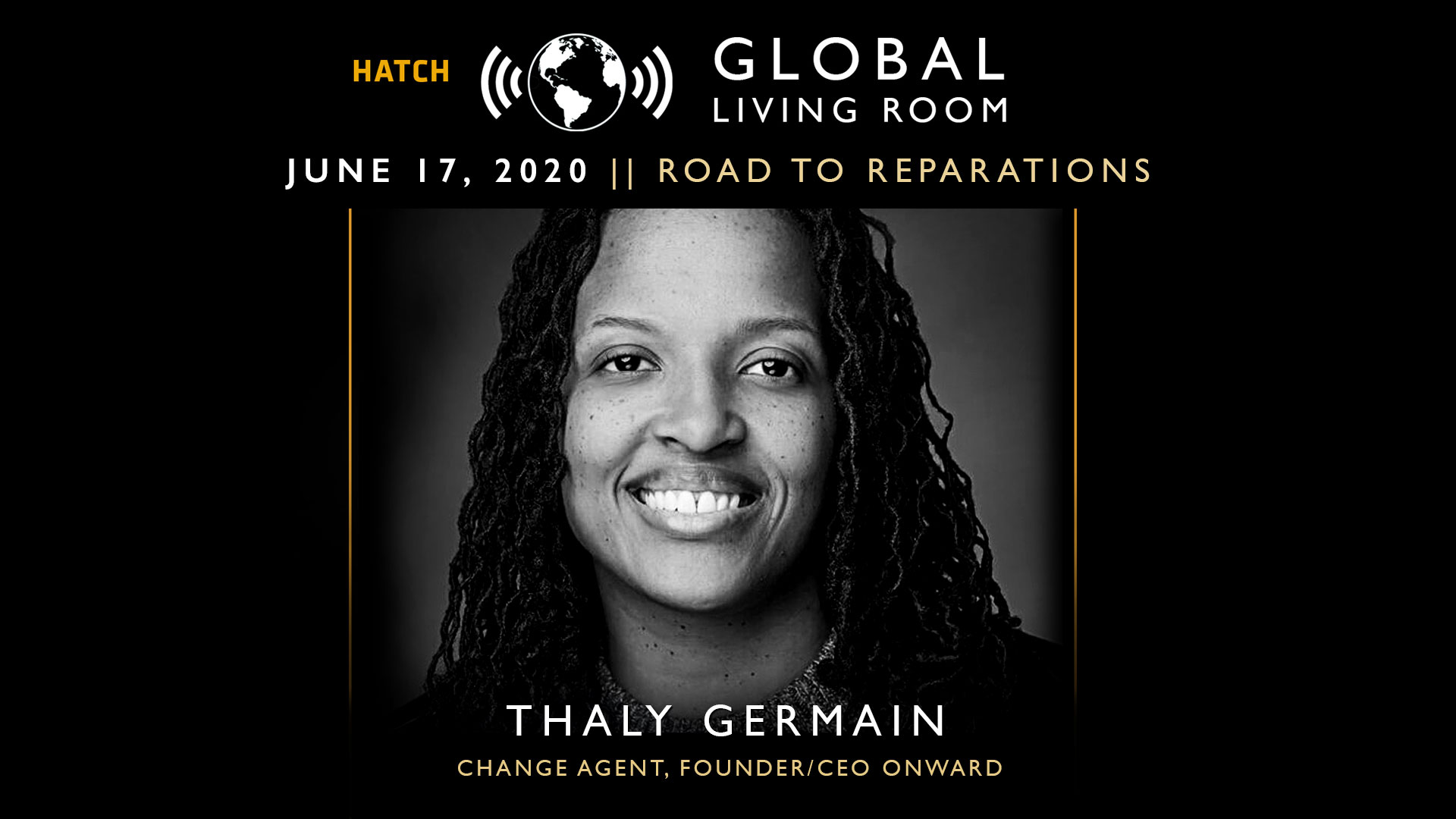Global Living Room 14 || Roadmap to Reparations
We are long overdue time for a massive shift of collective consciousness to transform hearts, minds, and habits of purposeful people and beyond to end racism – from protests to policy.
Our challenge this week was to identify ways we can step off the sidelines and unify allies, in a call for a moral revival. The intention is to mobilize as a network and in our communities to support the black community and seek pathways toward equity.
Our key guest speaker was Thaly Germain, Founder & CEO of Onward – a company that designs and delivers innovative learning experiences that build personal and organizational capacity for change. Thaly previously served as Executive Director of the Lynch Leadership Academy at Boston College, and was the Executive Director of Aligned Staff at New Leaders, a national leadership development organization. Her career in leadership development has been informed by her work as a school principal in Washington, DC, and teaching in New York and Washington, DC classrooms.
Thaly started Onward because she was too comfortable doing the work in her previous leadership roles, and because the death of Sandra Bland while in police custody made the dangers of an inequitable, racist legal system too stark and personal to ignore.
The session opened with cellist and composer Kendall Ramseur playing a piece that grounded participants in the moment, peeling away the distractions that have overwhelmed so many digital communications in the past few months.
Moderator Marques Anderson, Founder of World Education Forum, led the group in reflecting on individual growth edges and recognizing the somatic experience of collective trauma. The reflection set the stage for deeper empathy and full presence for the next 90 minutes.
“This is a moment of courage for all of us…you’ll be afraid to hold yourself accountable for the highest standard of our humanity.” – Thaly Germain
Thaly began her remarks by telling the story of her cousin, Frank, a 6′ 7″ tall black man who grew up in New York City. When he was 15 he was running to catch the school bus with friends when the group was stopped by officers, and immediately had their heads slammed down on the hot hood of a cruiser. When they asked what they had done wrong, the police officers said “you know what you did – why are you running?” They were assumed to be running from the scene of a crime because they were young black men. Frank never told anyone that story – accepting it as what it meant to be black in America. It wasn’t until very recently he realized how deeply traumatized he was by the encounter.
This winter Thaly was in a theater watching the film adaptation of James Baldwin’s unfinished book “I Am Not Your Negro“when a white woman sitting nearby felt entitled to physically hit her in order to get attention, then told her she had to shut her phone off or else ‘she would call the authorities.’
Just this month, she held a video chat with her sister and looked over at her 7 year-old niece to see her writing “Black Lives Matter” over and over again. A young child writing the affirmation of her own humanity in a society that has refused to acknowledge it for centuries.
Thaly segued her personal experiences into a broader reflection on truths we’ve silently supported for generations, and are in need of personal and systemic dismantling:
- We have not yet pulled the lever to create radical change in our country. Our current approaches to racism (inclusion and diversity trainings) are antiquated, and you can’t use quick, technical solutions to solve complex, adaptive problems. This isn’t a moment, it’s a movement that needs real time and real work.
- As a country we think we know better than everybody else. We need to get over that and acknowledge what we can learn and apply from other places.
- We’ve collectively avoided addressing the core issue of racism. Stop saying there are “achievement gaps” in our education system and acknowledge racism is why they exist. Stop asking why people are so angry and burning property in their own cities, and acknowledge it’s because racism has inflicted generations of pain and economic inequality.
As Thaly wrapped her remarks Marques transitioned into the day’s challenge for breakout sessions: “How Can We Apply Innovation to Dismantle Racism?”
Responses from breakout groups
The call to action for all participants was to recognize where discomfort lies around the topic of racism, to sit with the feeling, and find ways to stay engaged in the movement for equality.
Session’s list of resources for continued education and activation
- Jay Hirschton‘s “Share the Power to Build the Power“
- Bessel Van Der Kolk’s “The Body Keeps the Score“
- Audre Lord‘s “The Erotic as Power“
- Black Illustrations, a free source of digital art to better represent black people in websites and online advertising.
- Indigenous Visions‘ online event “Advancing Equity | Social and Environmental Justice in Indian Country ” on June 19th
As Thaly wrapped her remarks Marques transitioned into the day’s challenge for breakout sessions: “How Can We Apply Innovation to Dismantle Racism?”
Responses covered:
Closed loop systems (applied from agriculture to culture)
Educating and pushing/provoking our core community to discuss and challenge ourselves with the subject, deliberately.
Creating a dashboard of funding distribution (police, education) …looking at numbers that show the extent of the issue instead of just ideological slogans. Decentralize data
Healing work, staying focused on raw and real. Listening, personal self inventory, blind spots, trauma informed processes. building the web of life. Also challenging structures in place and reform criteria for inclusion, diversify boards. Also economics, be aware of where we spend our money- support minority owned businesses, budget for programs and supporting speakers of color

THALY GERMAIN
Thaly Germain is Founder / CEO of Onward, where she oversees program strategy, development, and implementation. Onward designs and delivers innovative learning experiences that build personal and organizational capacity for change. Most recently, Thaly served as executive director of the Lynch Leadership Academy. Prior to that she was the executive director of aligned staff at New Leaders, a national leadership development organization. Thaly gained much of the firsthand experience and knowledge which has informed her career in leadership development while serving as a principal in Washington, DC, and teaching in New York and Washington, DC.
HATCH is a non-profit founded in 2004 – a global network with an ecosystem of annual summits and year-round think tank sprints with the goal of accelerating solutions to global challenges. For the past 17 years we’ve brought together people from diverse backgrounds and industries so we can tackle some of humanity’s most pressing challenges with a broad spectrum of skill sets and perspectives. At the onset of COVID-19 we realized it was more important than ever to connect people in the digital realm so we can continue to collaborate and do meaningful work in a time of limited in-person gatherings. Each Global Living Room is focused on providing resources and a roadmap for action, recognizing the need for clear direction in a time of great uncertainty.
